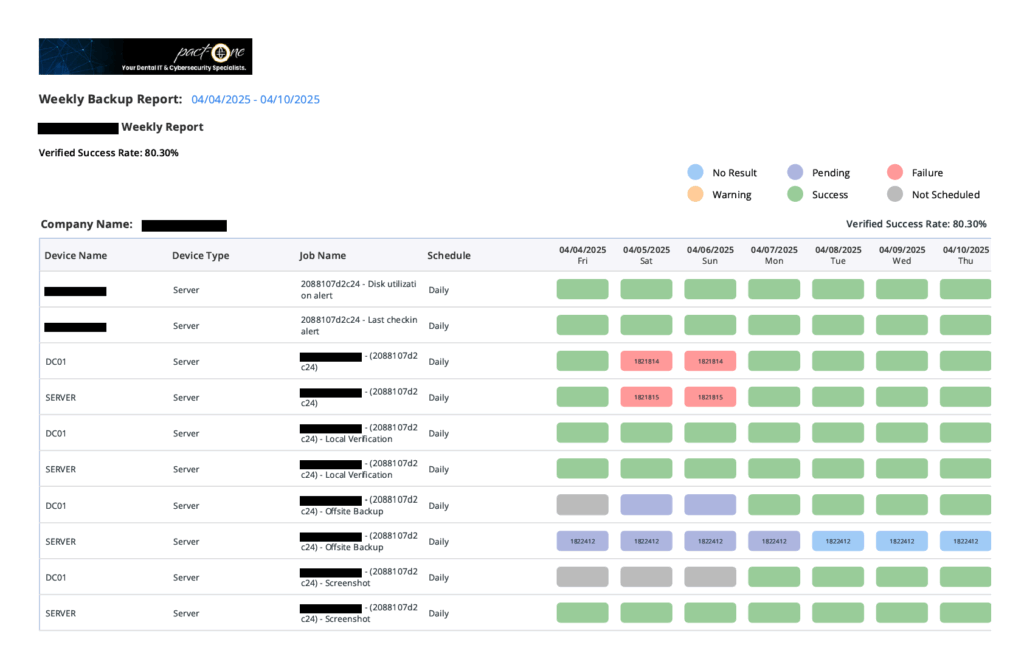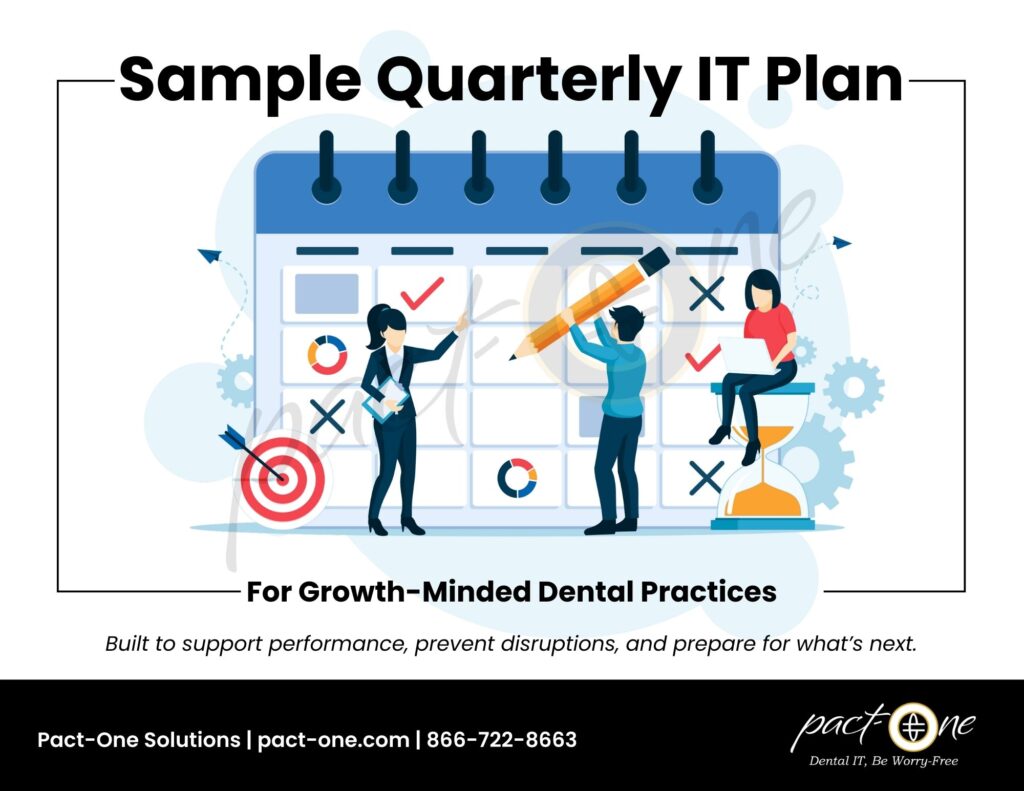If you've ever watched an operatory grind to a halt because an imaging system froze at the worst possible moment, you already know how much the wrong IT partner can cost you. Your day moves fast (patients in chairs, hygiene checks stacking up, the front desk juggling calls), and your technology has absolutely zero room for drama.
That’s why choosing the right dental IT partner matters so much. Not just someone who “handles computers,” but someone who understands your clinical workflow, software stack, imaging demands, security risks, and the rhythm of a real-life dental day.
Dental IT isn’t general IT.
It’s specialized, regulated, fast-moving, and tightly connected to nearly every part of your practice. And when it isn’t done well? You feel it instantly...in slow systems, frustrated staff, lost production, and stress you definitely didn’t schedule.
To help you make a confident decision, here are 7 traits that consistently stand out in dependable, dental-focused IT providers and how to spot them before you sign.
1. They Understand Dentistry at a Workflow Level, Not Just a Technical One
A great dental IT partner doesn’t need you to explain why your CBCT is choking the network or why Dentrix slows down when the admin team runs the Day Sheet at the end of the business day.
They already know.
Because dental environments are their home turf.
Look for:
- Daily experience with practice management systems like Dentrix, Eaglesoft, Open Dental
- Hands-on familiarity with imaging systems (DEXIS, iTero, CBCT, sensors)
- Understanding of how front office, ops, hygiene, and clinical workflow intersect
- Experience fixing bottlenecks unique to dentistry (imaging load spikes, database conflicts, slowness during peak hours)
Diagnostic question to ask:
“What dental software do you support every single day and how do you support it?”
The right provider will answer confidently and quickly.
2. They Build Cybersecurity Like They Expect an Attack Tomorrow
And honestly?
They should.
Healthcare is one of the top two most targeted industries for cyberattacks, and dental practices absolutely fall in those crosshairs. And without the proper network security tools and services in place, you risk:
- Data loss
- Exposure of sensitive information
- Costly ransomware attacks
- HIPAA compliance liabilities
- Reputational damage
A strong dental-focused IT provider delivers layered cybersecurity, including:
- A protective barrier between your practice’s internal network and the outside world with an enterprise firewall
- Device protection with endpoint detection and response (EDR)
- Proactively identifying and resolving security weaknesses with real vulnerability scanning
- A full-time security team that monitors your network 24/7/365 through managed detection and response (MDR)
- Resiliency and business continuity through hardened backup strategies (on-site + air-gapped off-site)
- HIPAA-aligned security protocols such as multi-factor authentication, encrypted storage of PHI, secure disposal of drives, business associate agreements, etc.
Real data worth noting:
- 60% of data breaches stem from human error
- Healthcare is the second highest targeted industry for ransomware attacks
- Downtime costs for a dental practice range from $875-$1,165+ per hour
Diagnostic question to ask:
“Can you walk me through your security layers and what each one does?”
If they can’t simplify it…
They likely don’t fully understand it.
3. They Prioritize Prevention Over Band-Aid Fixes
Reactive IT = expensive IT.
Proactive IT = predictable, calm, reliable operations.
Strong dental technology partners are constantly watching:
- Imaging server performance
- Network health metrics
- Hardware aging and failure patterns
- Backup success logs
- CPU load spikes
- Software version compatibility
- Patch and update cycles
They prevent problems instead of responding late.
Diagnostic question:
“How often do you proactively audit our environment, and what does that report include?”
Look for monthly or quarterly audits with:
- Asset age charts
- Backup health logs
- Security events summary
- Identified risks + recommendations
Anything less → prepare for future downtime.
4. Their Response Times are Quick and Proven with Real Data
Nearly every IT company claims “fast response times.”
Strong ones prove it with:
- Actual response-time averages
- Resolution-time metrics
- Escalation pathways
- Support team structure
- Clear Service Level Agreements (SLAs)
- Multi-channel support (phone + portal + email)
The difference is dramatic:
| General IT Provider | Dental IT Provider | |
|---|---|---|
| Sensor stops reading | “We can get to it later.” | Remote fix in minutes; onsite dispatched if needed |
| Imaging slowness | “Try rebooting.” | Root-cause analysis of server load + bandwidth |
| Server outage | Minimal updates | Clear communication + rapid triage + failover strategy |
Diagnostic question:
“Can you show me the past 90 days of anonymized response-time data?” or “Can you break down how your support team is structured and how my issue would be resolved?”
If they hesitate → trust your instincts.
5. They Support Your Long-Term Growth, Not Just Your Daily Operations
A technology partner should help your practice grow, not just “run.”
True IT partners help with:
- Multi-location planning
- Technology standardization across providers or ops
- Expansion preparation (ops, hygiene, new providers)
- Imaging and hardware upgrade guidance
- Cloud-readiness evaluations
- 3-year technology roadmaps
Diagnostic question:
“Can and how would you build us a 1–3 year technology roadmap?”
If they can't articulate future needs, they aren’t thinking like a partner.
6. They Communicate Clearly and Confidently without Jargon
Great dental IT providers make technology feel understandable, not overwhelming.
They communicate:
- Problems
- Solutions
- Timelines
- Costs
- Risks
- Expectations
…in plain English, not tech-speak.
Watch for communication traits like:
- Proactive updates during outages (such as those posted on the Pact-One Technical Alerts page)
- Clear next steps
- Documentation of changes
- Transparency in decision-making
- Patience with non-technical staff
Diagnostic question:
“How do you communicate during a major outage or cybersecurity incident?”
You want to hear:
- Frequent updates
- Transparent timelines
- Clear instructions
Anything else is a red flag.
7. They Back Their Quality with Proof, not Promises
Strong dental IT providers don’t hide behind marketing statements.
They show you the data.
Look for:
- Monthly or quarterly reporting
- Hardware lifecycle reports
- Security incident logs
- Uptime percentages
- Backup validation logs (like the one shown below)
- Ticket response benchmarking
- Client case studies
- IT Asset disposal certificates
Diagnostic question:
“Can you provide sample reports or documentation you regularly deliver to clients?”
If they say “We don’t normally provide that”…
That tells you everything you need to know.

Example of a Pact-One Solutions data backup radar report for a dental office.
Comparison Guide: General IT Proivder vs. Dental IT Partner
| Category | General IT Provider | Dental IT Provider |
|---|---|---|
| Dental knowledge | Minimal | Deep daily expertise |
| Cybersecurity | Antivirus + firewall | Multi-layered, HIPAA-ready |
| Problem-solving | Reactive | Preventative |
| Response times | Hours to Days | Minutes to Hours |
| Communication | Jargon-heavy | Clear, proactive |
| Reporting | Rare | Routine + transparent |
| Strategic planning | Short-term only | 1-3 year roadmap |
Want to know how your current IT provider really stacks up?
Our IT Analysis gives you a transparent, unbiased breakdown of your environment...complete with risks, opportunities, and clear next steps.
You’re already on the site, so when you’re ready, head over to the IT Technology Performance Analysis page and get insights that help you make confident decisions.
Dental IT. Remove the Burden. Embrace the Use.
Quality patient care – it's ultimately why you became a dental professional. But, some business operations can get in the way (such as pesky computer issues or lack of IT support). That’s where Pact-One Solutions can help! Our passion lies in supplying reliable, responsive dental IT support and security that practices can count on.
Whether you’re looking for dental IT services for your startup or searching for more responsive dental IT support – our team of dental IT specialists have you covered. With team members throughout the United States, we offer nationwide support to dental practices of all sizes, specialties, and stages of growth. Our wide range of dental IT services ensure your data is secure, accessible, and protected.
Don't let technology challenges hinder your ability to deliver exceptional dental care. Contact us at info@pact-one.com or 866-722-8663 to join over 3,000 dental professionals thriving with the support of a dedicated dental IT team.




You must be logged in to post a comment.